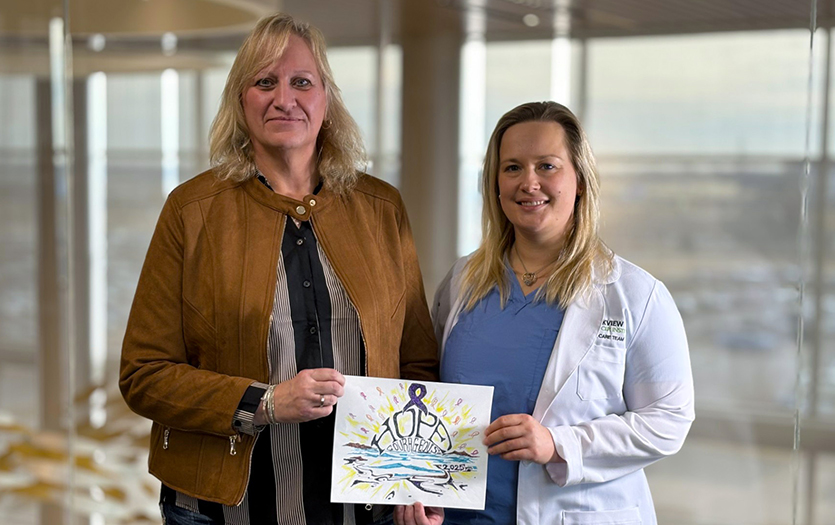
Current statistics tell us that 1 in 8 women will be diagnosed with breast cancer in their lifetime. But how does that measure up against heart disease, which is also a prevalent condition? The answer might surprise you. Linda Han, MD, FACS, Parkview Cancer Institute, walks us through the space where cardiovascular disease and breast cancer risk overlap.
The statistics
In 2018, there will be an estimated 266,120 new breast cancer diagnoses and approximately 40,920 deaths. While most people think that breast cancer is the No. 1 killer of women, that’s actually not true. This year, an estimated 40,500 people will lose their life to breast cancer and around 420,000 women will die of heart disease, making the latter the leading cause of death for women over age 20. Breast cancer is the leading cause of cancer death in women 45–79.
There are 42 million women living with cardiovascular disease, and 8 million with acute myocardial infarction (AMI)/angina, costing the country nearly $317 billion/year on treatment. There are 3.1 million female breast cancer survivors, and experts estimate we will spend $20.5 billion in healthcare on breast cancer treatment by 2020.
Risk factors
When it comes to risk factors for breast cancer and heart disease, there is a lot of overlap.
Risk factors for both include:
- Obesity
- Metabolic syndrome
- Diabetes
- Sedentary lifestyle
- Smoking
- Excessive alcohol use
- Hypertension (high blood pressure)
- Dyslipidemia (high or low blood lipid levels)
Obesity means having a BMI greater than 30, and is an issue for 35.9% of women over age 20 nationwide. An estimated 59.5% of women in Indiana are considered obese. Chronic low level inflammation is linked to cancer risk, while estrogen produced by fat tissue can drive growth of breast and endometrial cancers. Fat cells in general affect the processes that regulate cancer cell growth.
When a woman has diabetes, she’s more than twice as likely to have a heart attack. Her risk of breast cancer is also increased by 20-50 percent. Higher insulin levels encourage cell growth and discourage cell death, as well as increase sex hormones in the ovaries. This means an increased risk of ovarian, uterine and breast cancer. Insulin receptors on breast cancer cells have worse prognosis. Also, a higher blood sugar, means increased inflammation.
By age 50, 40 percent of women will have at least one cardiac risk factor, and 17 percent will have two or more risk factors. The majority of breast cancer is diagnosed in women over age 45.
A few risk factors specific to breast cancer include:
- Female gender
- Age
- Ethnicity/race: Ashkenazi Jewish
- Nulliparous
- Early menarche (<12)
- Late age at first live birth
- Late onset of menopause (>55)
- Family history of breast cancer
- Personal history of atypia on breast pathology
- Breast density
- Lifestyle factors: alcohol consumption, smoking, hormone replacement therapy (HRT)
Contrary to speculation, caffeine, deodorant, microwaves, cell phones and contact with someone who has cancer, are not risk factors for developing the disease.

Hormone replacement therapy
Research shows that HRT increases breast cancer risk. The longer the duration of the therapy, higher the risk. These women tend to have breast cancers detected at a more advanced stage. The risk does return to that of women who never used HRT after 3 years of discontinuation. HRT can also mean increased risk of heart disease, stroke and blood clots.
Patients considering HRT should do a risk/benefit assessment and work with their healthcare provider to establish an individualize therapy. It is also recommended to opt for the lowest dose for the shortest duration.
Survivorship and prevention
For those who survive breast cancer, risk of cardiovascular disease is higher than the risk of breast cancer recurrence. You can reduce your risk by getting plenty of exercise, limiting HRT, not smoking, maintaining a healthy weight and limiting alcohol consumption.
Patient and clinician communication is vital. Cardiac dysfunction is a serious side effect of certain cancer-directed therapies that can interfere with the efficacy of treatment, decrease quality of life, or impact the actual survival of the cancer patient.
It is important for oncologists and advanced care practitioners to initiate the discussion regarding the potential for cardiac dysfunction in individuals where the risk is sufficiently high, prior to start of therapy. For high risk patients, a tailored and detailed plan for cardiac monitoring throughout treatment and beyond should be established.
Direct scheduling of your annual mammogram is available through MyChart. Breast Diagnostic Center, Parkview hospitals and Parkview Cancer Institute locations now offer this convenient option for women due for their annual mammogram. Schedule Now



